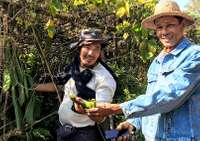สปอตไลท์สมาชิก ECHOcommunity: คุณ Tuntun และคุณ Thaung Si 2020-04-08

ข้อความตัดตอนมาจากรายงานโดย Patrick Trail – ECHO Asia
ขณะที่ผมเดินไปในฟาร์มกับคุณ Tuntun ในชนบทของพม่า ผมแทบจะอดยิ้มไม่ได้เพราะเขาได้นำเสนอถ่านชีวภาพที่เขาผลิตและใช้ในปุ๋ยสำหรับการปลูกต้นกล้าผลไม้ให้ผมดูอย่างภาคภูมิใจ แทนที่จะทำการเผาถ่าน ในตอนนี้เขาได้ใช้วัสดุของเสียอินทรีย์จากฟาร์มเพื่อเปลี่ยนให้กลายเป็นทรัพยากรอันมีค่าซึ่งสามารถใช้ผลิตพืชผลได้มากขึ้น แทนที่จะต้องสูญเสียคาร์บอนไปสู่บรรยากาศในรูปแบบควัน
ประมาณหนึ่งปีก่อนหน้า คุณ Tuntun เข้าร่วม Seed Saving Workshop ใน Pyin Oo Lwin และเรียนรู้วิธีการทำถ่านชีวภาพระหว่างหนึ่งในเซสชันลงมือปฏิบัติ หลังจากนั้นเขาก็กลับบ้านทันทีและลองทำด้วยตนเองจนประสบความสำเร็จเป็นอย่างยิ่ง ในตอนนี้คุณ Tuntun ยังมีเพจ Facebook เพื่อแบ่งปันเทคนิคการทำฟาร์มกับชาวนาคนอื่นที่พูดภาษาพม่าโดยเขาได้อธิบายวิธีการผลิตถ่านชีวภาพและอื่น ๆ อีกมากมาย!

คุณ Thaung Si (ซ้าย) และคุณ Tuntun (ขวา) แสดงเมล็ดถั่วพร้าที่มาจาก ECHO Asia Seed Bank และขณะนี้ได้มีการปลูกเพื่อแจกจ่ายไปยังธนาคารเมล็ดพันธุ์ในพม่า
หลายอย่างที่เกิดขึ้นในที่นี้มีต้นตอมาจากพันธมิตรหลักของเราในภูมิภาคดังกล่าว ซึ่งก็คือคุณ Thaung Si นั่นเอง คุณ Thaung Si เข้าร่วมกับเราในกิจกรรมการฝึกอบรมเป็นจำนวนหลายครั้งในฐานะเพื่อนและพันธมิตรระยะยาวของ ECHO Asia และเราได้เรียนรู้อะไรมากมายจากเขาเช่นกัน เมื่อสามปีก่อนเขาก่อตั้ง Community Seed Bank ที่ Lisu Baptist Theological Seminary โดยในธนาคารเมล็ดพันธุ์ของเขานั้น เขาได้สอนวิธีทำการเกษตรและการทำสวนให้กับนักเรียนและได้สร้างผลกระทบอย่างยิ่งใหญ่ในชีวิตของหลายคน จึงกล่าวได้ว่าเขาได้หว่านเมล็ดพันธุ์ให้กับผู้คนไว้มากมายทีเดียว และก็คือที่นี่เองที่คุณ Tuntun พร้อมทั้งเกษตรกรในท้องถิ่นและผู้เข้าร่วมอื่น ๆ เกือบหนึ่งร้อยคนได้รับการฝึกอบรมเกี่ยวกับถ่านชีวภาพและเทคนิคอื่น ๆ เมื่อปีที่แล้ว และหลังจากนั้นคุณ Thaung Si ก็ได้ติดตามพวกเขาอย่างสม่ำเสมอ
ชุมชน ECHO มีพันธมิตรมากมายที่อุทิศตนเป็นอย่างยิ่งทั่วทั้งภูมิภาคและทั่วโลกดังเช่นคุณ Thaunag Si เมื่อมีความพร้อม พันธมิตรเหล่านี้จะสามารถฝึกฝนผู้คนได้อีกมากมาย!



